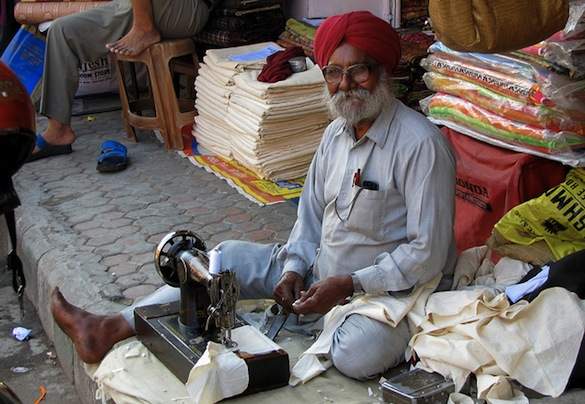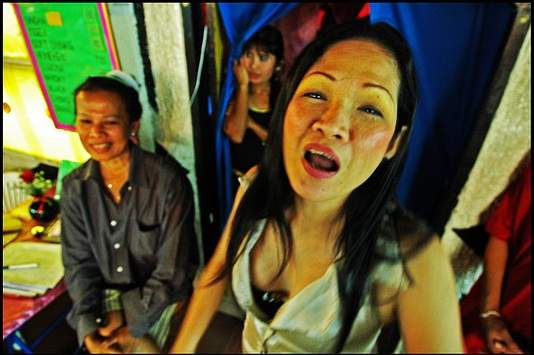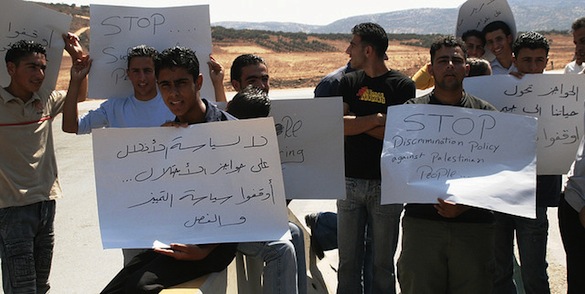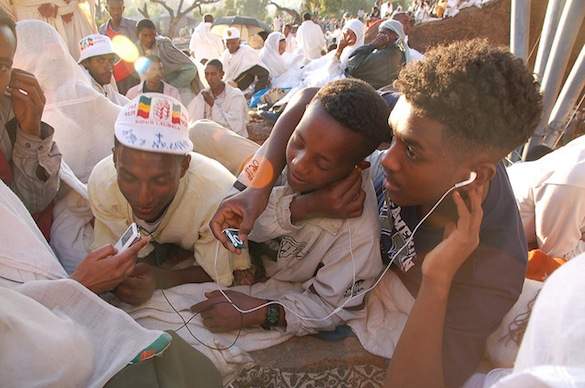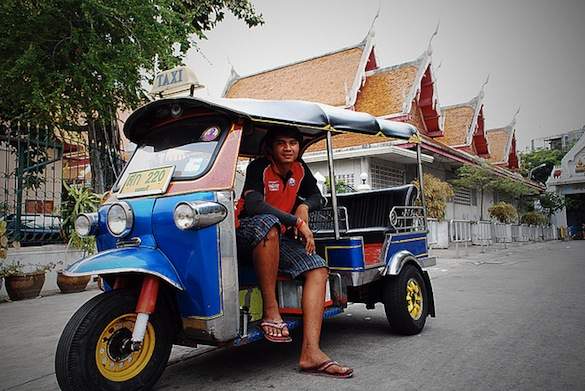Our “Sustainable Travel” series is sponsored by Global Basecamps. Global Basecamps is specialty travel company that helps independent travelers research and book locally owned boutique hotels, off-the-beaten path lodges and multi-day excursions all over the world. Whether hiking the Inca Trail, experiencing a traditional Japanese Ryokan, or relaxing on the beaches of Thailand, Global Basecamps specializes in designing completely customized itineraries to meet each travelers specific priorities and match their travel style.
Whether trundling down dusty African safari trails, spotting rainbow-feathered parrots in the Amazon rainforest or marveling at sunsets the color of molten lava, the developing world offers a flipbook of Kodak moments for the intrepid traveler. But in many areas, the beauty of the landscapes is juxtaposed with a backdrop of poverty and injustice that can leave the conscientious visitor questioning their travels altogether.
Traveling through the world’s poorest regions can be a minefield of dilemmas: how to enjoy the sights without causing a negative impact; how to turn away from the pleas of the under-privileged or help without it seeming like charity; how to behave in environments far from your comfort zone?
There are no simple answers but these eight points should give first-timers some food-for-thought for planning their trip. With a bit of consideration, pre-planning and sensitivity, there’s no reason why traveling in the developing world can’t be a positive experience all-round.
1: To give or not to give?
It’s the eternal question plaguing travelers; how to help those in need without giving into the often-overwhelming demands of beggars and street kids? There may not be a simple answer but there are, however, a few guidelines to follow.
Be wary of encouraging beggars and further accentuating the gap between rich and poor; instead try to focus on positive exchange by supporting those who are attempting to help themselves. Buy souvenirs, snacks and other items from street sellers and consider giving to street entertainers over beggars. If you really feel the need to give money to an individual, try to think of something they can do in ‘exchange’ – escort you to a local attraction, teach you some of their language or help you haggle for some local goods – anything to promote the idea that you are purchasing a service rather than giving charity.
When it comes to children, use your head over your heart – as much as the sight of a skinny, sweet-smiling street kid can tug at the heart-strings, remember that by giving money or gifts to a child you’re helping to cultivate a begging culture amongst the younger generation, as well as encouraging those who are exploiting orphans for their own profits.
2: Act like a local – but not too much!
Few westerners will achieve the feat of blending into a foreign environment but making an effort to do as the locals do will certainly help to bridge the cultural differences and give locals a positive image of travelers. Read up about cultural practices and taboos before arrival and watch carefully how the locals greet each other and the respect they show to elders or religious officials. Be particularly respectful of modest dress codes, alcohol restrictions and religious rituals and be aware of the fact that what’s deemed ‘normal’ in your home country may be very different overseas.
There is no reason why you have to adhere to all local customs, but taking part can offer a much greater insight into the country’s unique culture, so never be afraid to try. Whether shoveling food into your mouth with your hands, balancing on top of a local chicken bus or covering your hair in Muslim areas, as long as you keep an open mind and a sense of humor, you’ll undoubtedly find the locals very accepting of your attempts to conform.
Be mindful of the fact that you are still a foreigner though – be very careful not to overstep the mark and offend, particularly when it comes to religious dress or rituals – best not to take part unless you are specifically invited to do so.
>> Read How to Travel Like a Local in Indonesia
3. Spend your money wisely
Bringing tourist dollars into a country may help boost the economy, but unless you make educated choices about how you spend, it’s unlikely that much of it will end up in the hands of those who need it most.
Think carefully about where and how you spend your money and remember that one of the best ways to help a struggling population is to provide job opportunities wherever you can. Distribute your money as locally as possible – use local laundry services, take public transport, buy toiletries and other necessities from the local markets, get your clothes/backpack/shoes repaired by local tailors, visit a local hairdressers – the options are endless. Not only will you save money and get a chance to interact with a greater number of locals, but you can rest assured that every penny spent is going to a worthwhile cause.
4: Set a good example
It’s a common hypocrisy of westerners that once on foreign soil, things deemed unacceptable, illegal or taboo in your own country suddenly become acceptable, but remember that your behavior can have consequences for those that you leave behind. Think carefully about your actions (excessive drinking or drug-use, for example) and how they not only create a stereotype of ‘westerners’ but how they influence local children who often idolize foreigners. Think hard about the example you are setting and try not to create a market for services that undermine local practices, change cultural values or exploit locals.
Far more treacherous is the unfortunately increasing market for sex tourism. Although not a pastime confined to the developing world, there are often many more human rights exploitations associated with sex workers in poorer regions – sex trafficking, underage sexual activity and forced prostitution, for example. Whether or not you suspect any wrongdoing, consider the fact that any participation is creating a demand and therefore inadvertently encouraging such practices. If you suspect that girls are being coerced or forced into work in the sex trade, report your suspicions to ECPAT.
>> Read about the Six Travel Types You Love to Loathe
5: Get educated
Traveling in the developing world offers the chance for much more than sightseeing – it can be an opportunity to learn about different cultural practices, religions and political situations, as well as opening your eyes to some of the injustices of the world. To make the most of your experience do your research before traveling. Read up on current events, famous figures and traditional practices, but remember to keep an open-mind until you get there – pre-formed opinions can sometimes be as harmful as ignorance.
Of course, the real education takes place on location so make the most of it – learn a bit of the language, ask as many questions as possible and speak to as many locals as you can. Don’t be afraid to ask about practices or occurrences that you are unsure about – as long as you are polite and respectful, many locals are happy to teach you about their culture and laughing about your differences can often be a bonding experience.
>> Read Myanmar: Watchdogs and the Watched
6. Volunteer because it’s needed, not just because you can
Volunteering can seem like an attractive opportunity for travelers looking to immerse themselves in a foreign culture and give back to their host communities, but be wary of doing it for the wrong reasons.
Weigh up your reasons for volunteering and consider what you have to offer – do you have transferable skills, teaching or medical qualifications or a good grasp of the local language? Are you capable of working off your own initiative and living in simple or isolated conditions? Does the country or community really need your help or do they just need an opportunity to help themselves?
Of course, there are many good reasons to volunteer, but be realistic with yourself – if you have little to offer you could be a drain on precious resources. Wouldn’t simply traveling and spending your money in local communities help anyway? Or why not assist organizations like Stuff your rucksack that allow you to help local communities during your travels.
For those that do decide to volunteer, make sure you ask plenty of questions before signing up and be wary of organizations that charge large sums of money for unskilled volunteers. If you have a genuine skill or experience, it’s likely that local NGOs would be keen to take you on as a volunteer for little or no living costs. Idealist has some excellent resources for those considering volunteer work.
>> Read How to Get Started with Voluntourism
7. Be aware of the pay-gap
Understand that the vast difference in income means that you will often be viewed as ‘rich’ by many of the locals. Be respectful of these differences and accept that you will be expected to pay a little more than local price. Of course, there’s no harm in engaging in some good-natured haggling (in some places it would be rude not to!) but be wary of pushing too far – ensure that the agreed price is fair for both parties.
Although there’s often little need to be paranoid about security, try not to tempt opportunistic thefts by flashing expensive wares or being overly trusting with your belongings – even locals that are honest and trustworthy may not be able to resist given the opportunity.
8. Choose tour companies carefully
Tourism is often an important source of income for developing nations, but some companies do the opposite of helping the communities they’re supposed to support by keeping most of the money out of the country and away from the local population. When looking for tour companies, choose those that work with local tour guides who receive a fair wage and that offer accommodations at smaller, family-run guesthouses instead of internationally owned chains; this way more of the money is put back into the community.
>> Read How to Negotiate with a Tour Guide to Get the Experience You Want
For more on traveling responsibly and in developing nations read:
- The Art of Traveling in Developing Countries
- 5 Ways to Experience Sustainable Travel
- How to Travel Around the World for $40 Per Day
- Make Some Green Travel Resolutions
Photos by: blindpew, lazaro lazo, paulhami, adaptorplug, Michael.Loadenthal, US army Africa , sameffron , dave_B_



